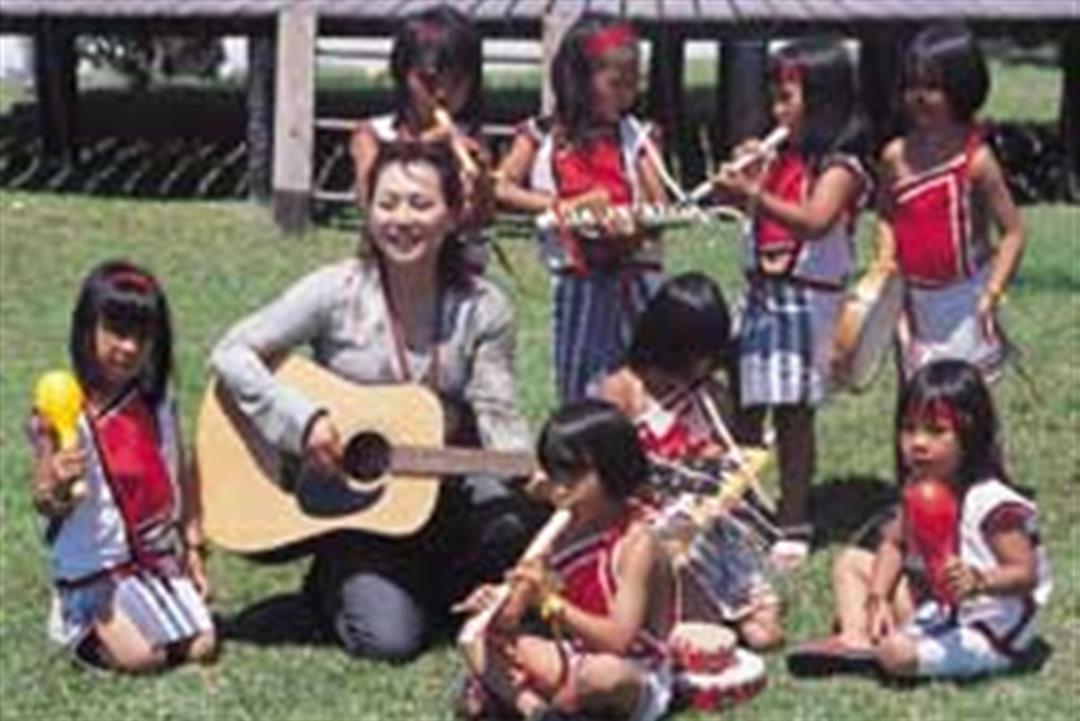
The late Amis singer Difang vaulted to worldwide renown in 1996 after his music scored a hit at the Atlanta Olympics, and fiery Chang Hui-mei (Ah-Mei), of the Puyuma tribe, has been one of the hottest pop divas in East Asia for the past several years. In the meantime, Ah-Mei's fellow Puyuma tribesmen Chen Chien-nien and Samingad raked in honors at the Golden Melody Awards by working the spirit of folk and pop into Aboriginal music. Music has become a vehicle for Taiwan's Aborigines, especially the young, to express their pride in their Aboriginal origins.
With Aboriginal music picking up steam, this year's 14th Golden Melody Awards were expanded to include an independent award for best Aboriginal vocalist. Surprisingly, however, there was not a single nominee. Will Aboriginal music turn out to be a flash in the pan? Or will it go on to greater things?
Several big-name Taiwanese companies recently launched a "Musical Instruments for Orchid Island" campaign. In just a month's time, organizers received donations of some 840 second-hand instruments, which have since been delivered to kindergartens, elementary schools, and junior high schools on Orchid Island. Perhaps the strong public response to the campaign was an indication of the importance that people in Taiwan attach to music education in our Aboriginal communities.
The 400-plus school-age children of Orchid Island go to one of four elementary schools and then the main middle school, but Langtao Elementary School is the only one with a rhythm band. The others don't have enough instruments for a complete band. Yeyou Elementary School, in fact, just has a motley collection of three harmonicas.
On the island of Taiwan, it is normal for each student to have his or her own musical instrument, but the extreme shortage of instruments on Orchid Island prompted Eastern Culture Foundation, KHS Musical Company, and Rocknet Taiwan to organized the "Musical Instruments for Orchid Island" campaign. The public responded enthusiastically, and within a month the stores run by KHS managed to gather in over 800 second-hand musical instruments, including guitars, alto recorders, electronic keyboards, "wooden fish" (a type of Buddhist percussion instrument typically used in temples), tambourines, harmonicas, triangles, and clappers. The haul exceeded expectations. Most donors insisted on anonymity, and some even bought new instruments to donate.
On April 2, the students of Yeyou Elementary School put on a performance using the donated instruments to show their gratitude. The performance included a traditional warrior dance and hair dance of the Tao tribe (known more commonly in English, until recently, as the Yami). One could see by the way the little children kept eyeing the instruments that they were anxious to play them.
Liao Hui-ting, a third-year student at Orchid Island Junior High School, has been learning the guitar for a year, and her most cherished dream is to have one of her very own. "Then I want to make a name for myself, just like Chang Hui-mei," she says. "The school has 30 guitars that were donated last year by the Rotary Club. You can only practice at school, but at least I'm around them all the time. After I graduate this summer, I'm going to go to senior high on the main island of Taiwan, and I may never play them again."
Chao Chun-wei, the music teacher at Orchid Island Junior High School, actually got his accreditation as an English teacher, but he learned to play classical guitar in college and was only too happy to teach music and serve as faculty adviser to the school's guitar club. Although students can only practice outside of class hours, says Chao, they have already learned a lot of basic chords, "and it's only the transitions that they're still a bit shaky with, because their hands are too small and it's hard to reposition smoothly, but Tao kids have amazing musical talent."
Chao says that there are no traditional musical instruments in the Tao culture, but their songs are beautiful. Chao had once thought to compile a collection of the Tao musical heritage, but he didn't carry through in the end. "Maybe it'll have to be done by some day by someone among the Tao," he says.
Many music teachers in Taiwan have also been coming to Orchid Island to teach. A couple of officers from the Air Force Wind Section, for example, have been coming twice a month to teach brass, woodwinds and percussion.
According to Clio Chi, executive director of the Eastern Culture Foundation, once given the opportunity to show their talent, Aboriginal children invariably end up surprising everybody. After the foundation started funding Paling Elementary School, a school in Taoyuan County attended by Aboriginal children, that school's website soon took first place in a nationwide contest and even became an outlet for online sales of the peaches grown on Lala Mountain, thus helping to spearhead local economic development.
The donation of musical instruments may be the spark that lights a fire. While we may not necessarily see a little Mozart or Chang Hui-mei appearing on the island 10 or 20 years down the line, we can still hope that this act of sharing will give the children of the Tao tribe a happy musical memory that they can carry inside for the rest of their lives, and that music will always be in their hearts.
p.44
After the arrival of a shipment of long-awaited musical instruments, the kids of Orchid Island played them all the time. Tsai Mi-mi, a noted musician and current chairman of Eastern Culture Foundation, is shown here having fun with some local children. (by Hsueh Chi-kuang)




@List.jpg?w=522&h=410&mode=crop&format=webp&quality=80)


